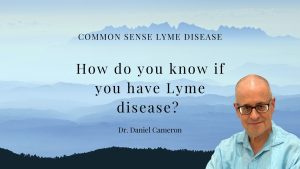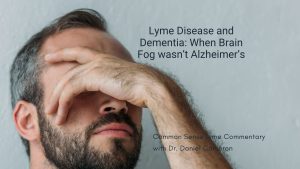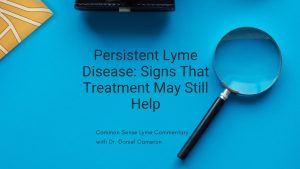Call for your appointment today 914-666-4665 | Mt. Kisco, New York

According to a study by Wormser and colleagues, from New York Medical College, “Patients with chronic Lyme disease were significantly more likely to be female than were patients diagnosed with either Lyme disease or with post-Lyme disease syndrome.”
“This finding,” says Wormser, “suggests that illnesses with a female preponderance, such as fibromyalgia, chronic fatigue syndrome, or depression, may be misdiagnosed as chronic Lyme disease.” [1]
However, it may be that women with chronic symptoms of Lyme Disease suffer instead from a severe immune response brought on by the illness.
A study by Aucott and colleagues from Johns Hopkins University School of Medicine states, “Individuals with ideally treated early Lyme disease have a greater than 12-fold higher risk of developing PTLDS [Post-Treatment Lyme Disease Syndrome] by six or twelve months post-treatment if their CCL19 [chemokine] level is higher than 111.67 pg/ml at one month post-treatment.” [2]
 High CCL19 chemokine elevations have been reported in immune illnesses. “Based on this, we speculate that elevated CCL19 levels may reflect an ongoing, immune-driven reaction at sites distal to secondary lymphoid tissue,” says Aucott.
High CCL19 chemokine elevations have been reported in immune illnesses. “Based on this, we speculate that elevated CCL19 levels may reflect an ongoing, immune-driven reaction at sites distal to secondary lymphoid tissue,” says Aucott.
Such high CCL19 chemokine levels may be the result of a persistent infection. “Studies using rodent and primate models,” states Aucott, “have suggested that the persistence of bacteria and/or spirochetal antigens after antibiotic therapy may drive disease.” [2]
The article entitled CCL19 as a Chemokine Risk Factor for Post-Treatment Lyme Disease Syndrome: A Prospective Clinical Cohort Study suggests several approaches to managing the elevated levels of CCL19 chemokine. Aucott points out that some physicians are electing to re-treat patients who are still symptomatic. “The use of short-term antibiotic retreatment in the early, post-treatment phase of Lyme disease has yet to be formally tested, although it may be widely applied in clinical practice.”
Other approaches included prescribing medications used to treat depression in an effort to decrease cytokine levels, behavioral interventions to help cope with pain and fatigue and cognitive rehabilitation.
References:
- Wormser GP, Shapiro ED. Implications of gender in chronic Lyme disease. J Womens Health (Larchmt), 18(6), 831-834 (2009).
- Aucott JN, Soloski MJ, Rebman AW et al. CCL19 as a Chemokine Risk Factor for Post-Treatment Lyme Disease Syndrome: A Prospective Clinical Cohort Study. Clin Vaccine Immunol, (2016).




I’ve been sick for 30 years. I’ve probably been bit 20 times at least. Even tho I had a rash my Dr denied me treatment a year ago. If this is immune caused why is there such a large reaction to die off and with repetitive rounds of treatment those die offs lesson. I also have 2 coinfections, Candida causing constant horrific rashes and HSV1 and sometimes 2, also systemic as well. I was given a bag of IVIG to up my platelets for cancer surgery. I have ITP, cause unknown or immune or microbe driven. These organisms have definite reproductive cycles with repeating symptoms. Of course I’ve never been told anything I have is autoimmune. I believe the bag of IVIG was contaminated with viruses not known to Americans. A shortage in the US caused my Dr to get it from China. I had so called aseptic (absurd) meningitis. I left the hospital almost catatonic and then had cancer surgery. I’m cancer free, the meningitis still present post infusion in 2010. Completely bedridden. Swamping sweats and nausea. This is autoimmune? sure feels like the worst flu or infection of my life. I’m 60 hrs old, I’ve given 29 of those to this dreaded disease. What will happen to me. They’re already talking nursing home. How about an intelligent, innovative Dr who doesn’t negate something’s existence because it can’t be cultured from blood, and thus must not exist quoted Eugene Shapiro, professor of epidemiology at Yale. That’s his theory. I cannot begin to explain the abuse I have received from these Yale egotists. Horrible insults about my weight caused by drugs they gave me like tricyclic antidepressants and neuronton. How about trying a bottle of antibiotics out antivirals dr, I screamed in my sleep. I’m so sick now i can barely sit up. Dysautonomia has appeared as my next adventure. I’m Afraid to take on biofilms by myself due to possible bleeding. IVIG was never supposed to be given to people with headaches, Black box warning everybody missed. I realize the original post is a bit old but I believe totally in Dr Horowitz’s description of MCIDS, Multiple systemic infectious disease syndrome..I don’t think I can even sit and wait for a Dr to hear me without gerting violently ill. Adding in esophageal motility issues, a hiatal hernia, bike reflux and a narrowed bowl have made treatment thru my GI track a nightmare. My husband is ill as well. He thankfully doesn’t get as sick as me though. And an article I read recently said Herpes feeds on probiotics and I think antivirals are murder weapons. Is there a way out for me. I’ve been to Hyde park before in my job as a sales rep for big pharma in Healthcare and infection control. Note I am a resistant infection host myself
I did a lousy job of getting the bugs out of me. Autoimmune?, Not feeling it. Even as a lowly med
tech I remember the symptoms of an infection. I think I’ve been chosen to be culled. No treatment, fill her with so many drugs she can’t think or remember and let her face away and die. I’m even to young to get Homecare from Medicare.
I need an LLMD but I’m on disability and insurance s don’t pay for long term Lyme treatments. They just give us the disease and abandon us. I wish I was dead every day but I won’t let whatever this is win. Any ideas?
Sheryl, please contact me if possible
The study by Aucott begs the question.
“Begging the question, sometimes known by its Latin name petitio principii (meaning assuming the initial point), is a logical fallacy in which the writer or speaker assumes the statement under examination to be true. In other words, begging the question involves using a premise to support itself.” grammarist.com
Aucott assumes the cytokine and chemokine changes cannot be due to chronic infection. His work is a disappointment.
Surely he must have observed that patients chronically ill with this disease report Jarisch-Hexheimer reactions when antibiotics are reintroduced. A Jarisch-Herxheimer reaction is driven by changes in cytokine levels associated with the lysis of certain kinds of microorganisms such as Borrelia.
The study that needs to be done that has not been done, in either animals or humans, is to compare pro-inflammatory cytokine levels in those with acute and chronic infection before, during, and after a period of antibiotic administration — and to compare this with a control group of those assumed not to be infected with any organism that would be predicted to cause a Jarisch-Herxheimer reaction (healthy controls).
In studies of human infection with Borrelia recurrentis, it has been shown that proinflammatory cytokines peak with antibiotic administration, driven by the lysis of the organism. There are several studies published in U.K. journals that show this very nicely, and how metapzinol, an opioid agonist-antagonist, inhibits pro-inflammatory cytokine release. The point of these studies was to find an intervention (here, metapzinol) that would depress the severe Jarisch-Herxheimer reaction associated with treatment of Borrelia recurrentis infections because treatment carried a high mortality rate due to the severity of the Jarisch-Hexheimer reaction. The Jarisch-Herxeimer reaction was so severe that physicians were scared to treat the patient due to the risk of death.
No studies have been done of the cytokine changes in the Jarisch-Herxheimer reaction in animals or humans associated with Borrelia burgdorferi infection. But the findings would be expected to be similar to what was reported with Borrelia recurrentis.
Then, one would design a study looking for the same pattern of proinflammatory cytokine release with the reintroduction of antibiotics in patients chronically ill with Lyme disease.
If there is NO ACTIVE INFECTION, one would not expect to see increases in proinflammatory cytokines with antibiotic administration. Nor would you expect patients to report that they experience symptoms of a Jarisch-Herxheimer reaction — but we all know this exists. Twenty years post acute infection, patients will report Jarisch-Herxheimer reactions with antibiotic administration. This is EVIDENCE OF CHRONIC INFECTION.
Clinicians with Lyme disease practices could do a simple case report using patients from their practices. It does not require a big federal grant to begin to demonstrate this finding. All one needs is access to a blood draw station that can competently collect samples to send to reference labs. Because cytokines degrade quickly, the collection process must be done properly and specimens sent on dry ice.
So why has this not been studied? It is the obvious study to do.
It seems to me that studies which beg the question are not unimportant, although they disappoint. Don’t they sometimes beg the question which needs to be asked NEXT?
Dr. Cameron and/or Dr. Shepler…. Is there a way that you can facilitate this study, or initiate it somewhere that could do it – a graduate student in need of a study, perhaps? I’m not a scientist and so get lost in a lot of the language, but I am a female patient who suffered greately, who endured 9 years of treatment (off and on, mostly ON because I could never get beyond a six month remission), who was misdiagnosed and tested for everything BUT Lyme disease – until finally I pushed and pushed for (and paid dearly for) better tests. My husband, who is a scientist, can’t stop wondering why some of us just get caught in this pattern of failed remissions… my term, because that’s how I see my journey. I used to consider myself a treatment failure but I’m now refusing that – it’s my remissions that keep failing, but why? Maybe this. Maybe this study mentioned by Dr. Shepler would help so many of us. Maybe not.
I was diagnosed with Lymes three weeks ago and am almost crippled by the end of the day, unable to bend, stretch or raise my arms. Have been on a Course of Doxycycline which does not seem to be doing much. Only relief is from NSAIDS which a I am now not supposed to touch because of Covid.
Any light at the end of the tunnel?
Thank you for this rebuttal! I appreciate your expression of knowledge. I can attest firsthand to the involvement of “herxes” as a chronic Lyme and co-infections “model”.
Could that be the base cause of my Ankylosing Spondylitis? I do have the HLA-B27 gene. I grew up in Minnesota and Wisconsin, and was well known for having wood ticks. I don’t remember deer ticks at all, but I didn’t see all the ones Ma took off me. What do I need to look for or be tested for? I’m in Utah now, and am 56 yrs old, in constant pain.
It doesn’t hurt to look a second time at diseases that overlap with Lyme disease
Again all Lyme patients are immunosuppressed, not just woman.
http://www.truthcures.org
The immune system is rather complex. The Aucott study demonstrated markedly elevate chemokines levels. It is helpful to drill down
As a male, I have a very pronounced 28 day cycle in my symptoms, post treatment. This seems more like active infection, as autoimmunity doesn’t really make sense. Another way it’s harder for women, because they are fobbed off by telling them it’s hormones.
Hi
Can it trigger scleroderma,systemic?
There are overlapping findings for most rheumatologic conditions. There has not been much written on the scleroderma.
In my experience Lyme and Co is the main trigger of autoimmune response, in my case it tries to trigger scleroderma, but Im treating Lyme and it keeps autoimmunity at bay. I plan to win Lyme with essential oils (natural antibiotics). Antibiotics didnt do much for my chronic and advanced Lyme.
So sorry to hear all that are suffering.i had Lyme Disease in 1989-90-91.
Luckily, I was under the care of Dr Derek Desilva. A specialist in NJ.
He put me on 4500mg of Amoxicillin,and 1500mg of Probenicid daily, for 91 days. It knocked out most of the symptoms, and then I continued to heal for another 2 1/2 years. I was active and extremely healthy for many years.However he did warn of a complication, which was Arthritis, in my later years. He was so right. No arthritis in my large extended family on either side, but I’ve got it. And it’s almost debilitating. The Rheumatologist that I go to put me on Prednisone and that has been giving me great relief. I can’t even walk without it. I’m not big on meds, but if it helps me to function, I will take them. Use them if you must. It’s better than being half alive.
I had to be on doxy for 9 months. Make sure you have a Lyme literate doc.https://www.lymedisease.org/find-lyme-literate-doctors/
I had to wait 4 months to see my dr but it was worth it. It was a tough road. But I made it. Don’t give up.
I’ve been on antibiotics 20 years..now my liver is messing up. Any ideas on safe things to take to kill bartonella babesia and lyme?
Sorry to hear you are still ill. It can be difficult for all doctors involved.
“This finding,” says Wormser, “suggests that illnesses with a female preponderance, such as fibromyalgia, chronic fatigue syndrome, or depression, may be misdiagnosed as chronic Lyme disease.” [1]
This is wrong and reversed. LYME DISEASE is misdiagnosed as fibromyalgia, chronic fatigue syndrome, and depression. DO NOT devalue the damage that Lyme disease can cause. There is a way to heal from Lyme disease, the other conditions are idiopathic.